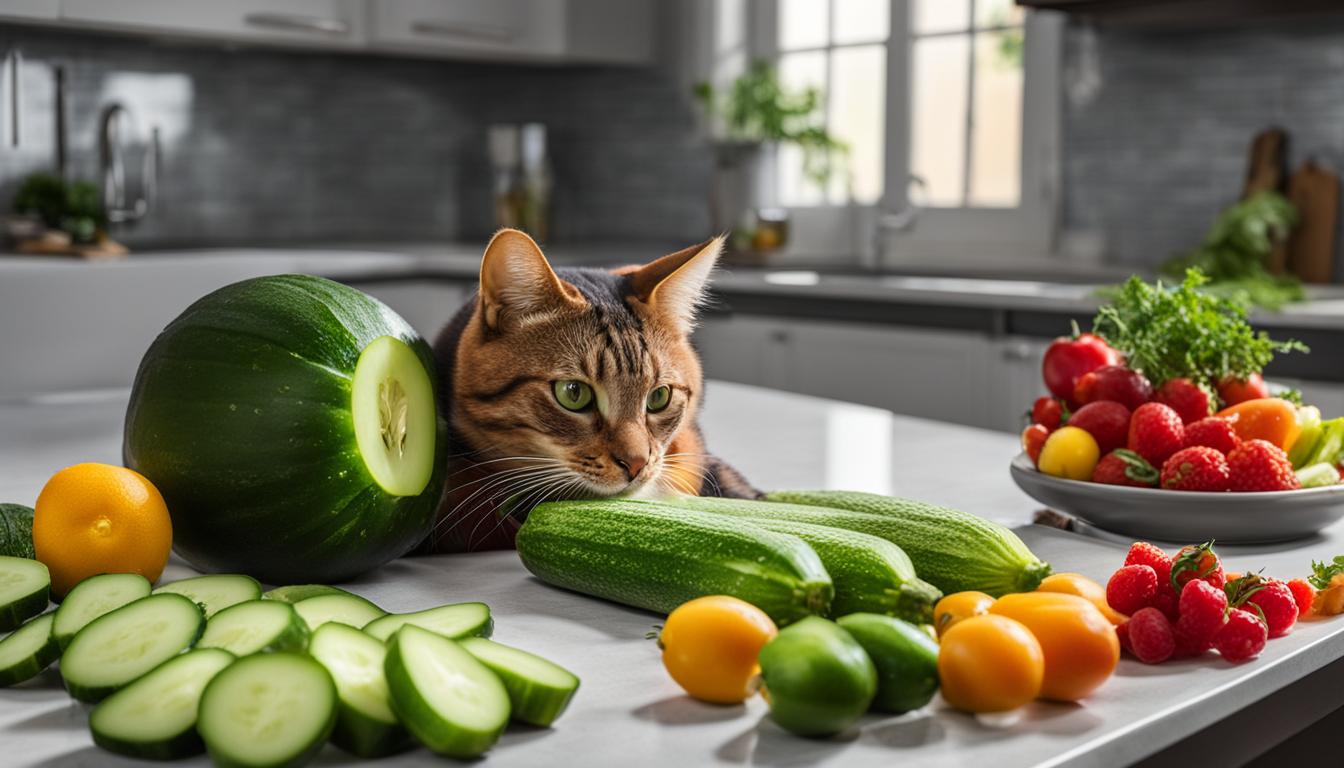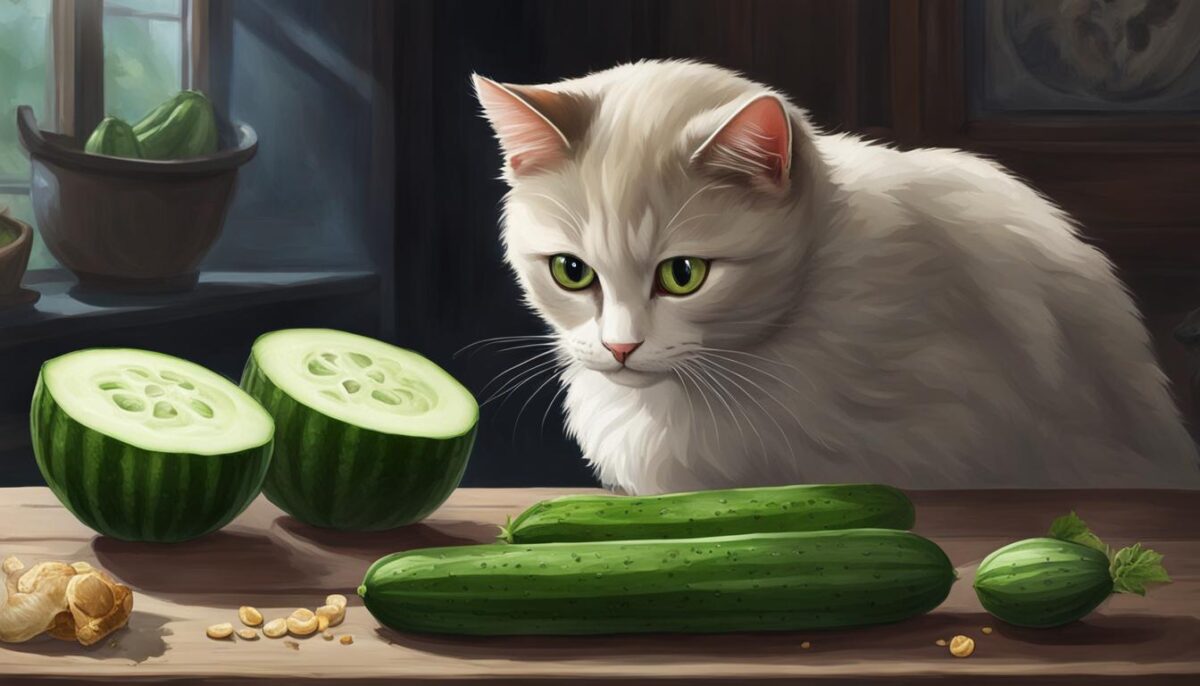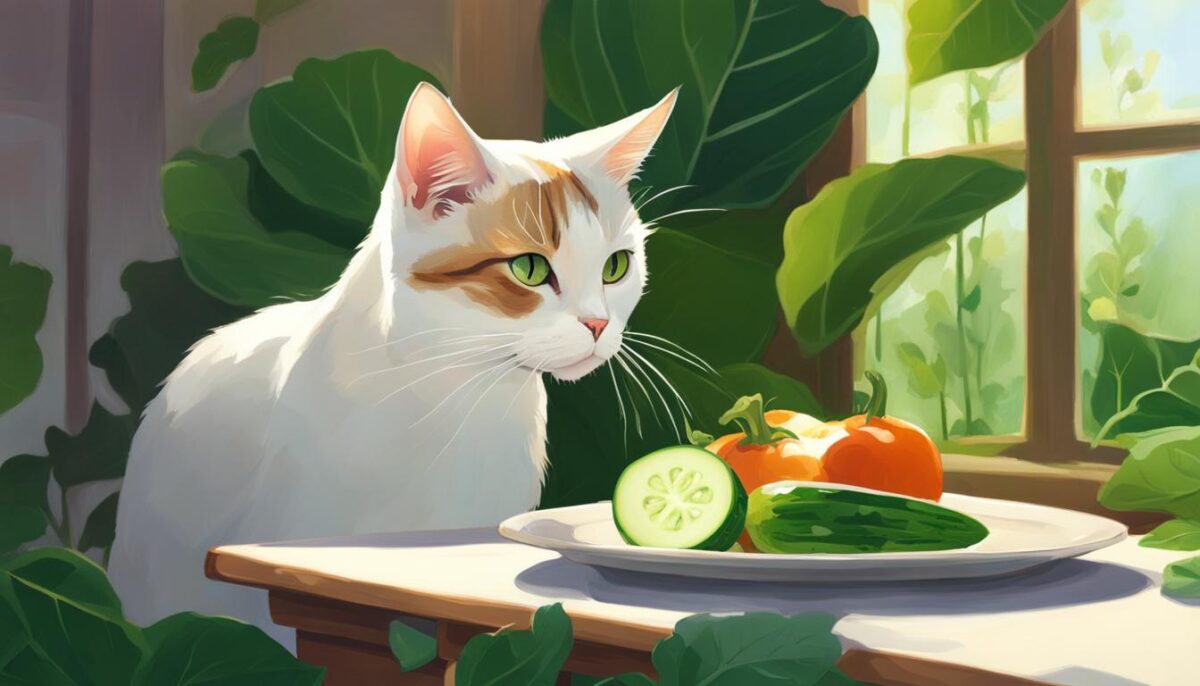If you’re a cat owner, you may have wondered whether it’s safe to feed cucumbers to your feline friend. Cats have specific dietary needs, so it’s essential to understand how certain foods, like cucumbers, fit into their nutrition. In this article, we’ll explore whether cats can eat cucumbers, the potential health benefits, and the precautions you should take when offering them to your cat.
Key Takeaways:
- Cucumbers are generally safe for cats to eat, but they should only be given in moderation.
- Cats are obligate carnivores, so the bulk of their diet should consist of animal protein.
- Cucumbers can provide hydration and are low in calories, making them a suitable snack for cats.
- It’s important to cut cucumbers into small, manageable pieces to avoid choking hazards.
- Always wash non-organic cucumbers thoroughly to remove any potential pesticides.
Health Benefits of Cucumbers for Cats
Cucumbers offer several health benefits for cats. One of the key advantages is hydration. Cats are known for their low thirst drive, which can lead to dehydration. However, cucumbers have a high water content, making them an excellent choice to help keep your cat hydrated. Adding a few small pieces of cucumber to their water bowl can provide a refreshing twist and encourage them to drink more.
Another benefit of cucumbers is that they are low in calories and fat. This makes them a suitable snack for cats who are watching their weight or need to maintain a healthy weight. You can offer plain, diced cucumber as a low-calorie treat to satisfy your cat’s cravings without adding unnecessary calories to their diet.
In addition to hydration and being low in calories, cucumbers also contain important nutrients for cats. They are a good source of vitamins such as Vitamin K and Vitamin C, as well as minerals like Molybdenum, Magnesium, and Potassium. These vitamins and minerals play key roles in supporting your cat’s overall health and wellbeing.
| Health Benefits of Cucumbers for Cats |
|---|
| Hydration |
| Low in calories and fat |
| Contain vitamins and minerals |
Cucumbers can also contribute to dental health for cats. Their crunchy texture can help scrape off minor plaque from your cat’s teeth, promoting good oral hygiene. While cucumbers can provide some dental benefits, it’s essential to prioritize regular dental care for your cat, including brushing their teeth and regular veterinary check-ups.
Overall, incorporating cucumbers into your cat’s diet can offer hydration, low-calorie options, and important vitamins and minerals. However, it’s important to remember that cucumbers should be given in moderation and as part of a balanced and species-appropriate diet. Consult with your veterinarian to ensure that cucumbers are suitable for your cat and to determine the appropriate amount to feed.
Risks of Feeding Cucumber to Cats
While cucumbers can be a safe treat for cats, there are some risks to consider when including them in your feline friend’s diet.
Choking Hazard: Cats have a small throat and may have difficulty swallowing large chunks or pieces of cucumber. It is important to cut cucumbers into small, manageable pieces to prevent choking.
Pesticides on Cucumbers: Non-organic cucumbers may contain pesticide residues on their skin. It is recommended to wash them thoroughly or choose organic cucumbers to minimize the risk of exposing your cat to harmful chemicals.
Digestive Issues: Cucumbers, especially the peel, are relatively high in fiber. Feeding large amounts of cucumber to your cat can potentially lead to digestive problems such as diarrhea or upset stomach. It is best to offer cucumbers in moderation.
Seasonings: Certain seasonings like garlic and onion are harmful to cats and should be avoided. It is important to feed cucumbers plain and without any additional seasonings or spices.
Allergic Reactions: Although rare, some cats may have an allergic reaction to cucumbers. If you notice any signs of an allergic reaction such as itching, swelling, or difficulty breathing, it is crucial to seek veterinary care immediately.
Table: Common Risks of Feeding Cucumber to Cats
| Risk | Description |
|---|---|
| Choking Hazard | Large chunks or pieces of cucumber can pose a choking risk for cats. |
| Pesticides on Cucumbers | Non-organic cucumbers may contain pesticide residues that could be harmful to cats. |
| Digestive Issues | Cucumbers, especially the peel, are high in fiber and can cause digestive problems if fed in large amounts. |
| Seasonings | Seasonings like garlic and onion are toxic to cats and should be avoided when feeding cucumbers. |
| Allergic Reactions | Some cats may have an allergic reaction to cucumbers, although it is rare. |
How to Feed Cucumber to Cats Safely
Feeding cucumbers to your cat can be a safe and enjoyable way to offer them a refreshing and nutritious treat. However, it’s important to follow some guidelines to ensure the safety of your furry friend. Here are a few safe ways to offer cucumbers to your cats:
- Diced cucumber: Cut the cucumber into small, bite-sized pieces that are easy for your cat to chew and swallow. This will help prevent any choking hazards.
- Cucumber water: Add a few small pieces of cucumber to your cat’s water bowl. This will not only provide a refreshing twist to their water but also encourage them to stay hydrated.
- Cucumber-tuna salad: Combine diced cucumber with some tuna or a tuna-based wet cat food to create a tasty and healthy salad for your cat. This can be served as a special treat or mixed in with their regular meals.
- Frozen cucumber: During warmer months, you can freeze some cucumber slices and offer them to your cat as a cooling treat. This will help them beat the heat and provide a fun and refreshing snack.
- Blended cucumber: If your cat has difficulty chewing or is in need of extra hydration, you can blend some cucumber with water to create a puree. This can be served as is or added to their wet food for an extra boost of hydration.
Remember to always introduce cucumbers slowly and in small amounts to test for any allergic reactions. Additionally, it’s important to consult with your veterinarian before making any significant changes to your cat’s diet. By following these safe feeding methods, you can ensure that your cat enjoys the benefits of cucumbers while staying healthy and happy.
The Importance of Safe Feeding Methods
Feeding cucumbers to your cat can be a great way to offer them a healthy and hydrating treat. However, it’s crucial to practice safe feeding methods to avoid any potential risks. Always cut cucumbers into small pieces to prevent choking, choose organic cucumbers or wash them thoroughly to remove any pesticides, and be cautious about using seasonings or ingredients that may be harmful to cats. By following these guidelines, you can ensure that your cat’s cucumber consumption is a safe and enjoyable experience.
Can Kittens Eat Cucumbers?
When it comes to feeding cucumbers to kittens, it’s important to exercise caution. While adult cats can safely enjoy cucumbers in moderation, kittens have more sensitive digestive systems and specific nutritional requirements. As a result, it is not recommended to introduce cucumbers into a kitten’s diet without consulting a veterinarian first.
Kittens need a balanced and age-appropriate diet that provides them with essential nutrients for growth and development. Their nutritional needs are best met through high-quality kitten food that is specifically formulated to support their unique requirements. These specialized kitten diets are carefully formulated to provide the right balance of proteins, fats, and vitamins needed for optimal health.
Introducing new foods to kittens can be risky, as their digestive systems may not be able to handle certain foods, including cucumbers. It’s best to prioritize their nutritional needs and rely on a trusted veterinarian’s advice when it comes to incorporating new foods into a kitten’s diet. They can provide guidance on when and how to introduce treats or additional foods like cucumbers, ensuring that the kitten’s health and well-being are not compromised.
| Feeding Cucumbers to Kittens | Sensitivity of Kittens to Cucumbers |
|---|---|
| It is not recommended to feed cucumbers to kittens without consulting a veterinarian first. | Kittens have more sensitive digestive systems and specific nutritional requirements. |
| High-quality kitten food is best for meeting their nutritional needs. | Kittens’ diets should prioritize their growth and development. |
| Consult with a veterinarian before introducing new foods to kittens. | They can provide guidance on when and how to incorporate treats or additional foods like cucumbers. |
Conclusion
In conclusion, cats can safely eat cucumbers as long as they are introduced in moderation and prepared correctly. Cucumbers offer some health benefits, such as hydration, low-calorie options, and a few essential vitamins and minerals. However, it’s important to be aware of the potential risks involved.
When feeding cucumbers to cats, it’s crucial to cut them into small, manageable pieces to avoid choking hazards. Non-organic cucumbers should be thoroughly washed to remove any pesticides. Additionally, cats should not consume large amounts of cucumber, as the high fiber content could lead to digestive issues.
Safe ways to feed cucumbers to cats include offering plain, diced cucumber, combining it with tuna or wet food for added flavor, or even freezing it as a cooling treat. Blending cucumber with water creates a hydrating puree that can be served alone or added to wet food. However, it’s essential to remember that cucumbers should not replace a balanced and species-appropriate diet for cats.
Always prioritize your cat’s nutritional needs and consult with a veterinarian before introducing new foods. By following safe feeding practices and being mindful of the risks, you can ensure the well-being of your feline friend when incorporating cucumbers into their diet.
FAQ
Can cats eat cucumbers?
Yes, cats can eat cucumbers in moderation.
Are cucumbers safe for cats to eat?
Cucumbers are generally considered safe for cats to eat, but there are some considerations to keep in mind.
What are the health benefits of cats eating cucumbers?
Cucumbers provide hydration for cats, are low in calories and fat, and contain vitamins and minerals such as Vitamin K, Vitamin C, Molybdenum, Magnesium, and Potassium. They can also help with cats’ dental health by scraping off minor plaque.
What are the risks of feeding cucumbers to cats?
Risks include choking hazards from large chunks, pesticides on non-organic cucumbers, potential digestive issues from high fiber content, and allergic reactions.
How can I safely feed cucumbers to my cat?
Offer plain, diced cucumber in small pieces, combine cucumber with tuna or wet cat food, add small cucumber pieces to the water bowl, layer thin slices with wet food, serve frozen cucumber as a treat, or blend cucumber with water for hydration.
Can kittens eat cucumbers?
It is not recommended to feed cucumbers to kittens due to their sensitive digestive systems. Consult with a veterinarian before introducing new foods to kittens.
Can cats have cucumber as a treat?
Yes, cats can have cucumber as a treat, but it should only make up a small portion of their overall diet.
What precautions should I take when giving cucumbers to cats?
Cut cucumbers into small, manageable pieces to avoid choking hazards, wash non-organic cucumbers well to remove pesticides, and monitor for any signs of allergic reactions or digestive issues. Seek veterinary care if any symptoms occur.


